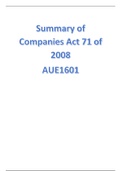3.
Explain the Companies Act requirements concerning pre-incorporation contracts.
Réponse: A person may enter into a written agreement in the name of or on behalf of, an entity that is contemplated to be incorporated, but does not yet exist at the time.
A person who does anything as explained above, is jointly and severally liable with any other such person for liabilities created as provided for in the pre-incorporation contract while so acting, if
(a) The contemplated entity is not subsequently incorporated; or
(b) After being incorporated, the company rejects any part of such an agreement.
If, after its incorporation, a company enters into an agreement on the same terms as, or in substitution for, an agreement contemplated above, the liability of the person in respect of the substituted agreement is discharged.
Within three months after the date on which a company was incorporated the board of that company may completely, partially or conditionally ratify or reject any pre-incorporation contract purported to have been made in its name or on its behalf.
If, within three months after the date on which a company was incorporated, the board has neither ratified nor rejected a particular pre-incorporation contract, the company will be regarded as having ratified that agreement.
To the extent that a pre-incorporation contract has been ratified
(a) The agreement is enforceable against the company as if the company had been a party to the agreement when it was made; and
(b) The liability of a person who entered into the pre-incorporation contract in respect of the ratified agreement is discharged.
If a company rejects the agreement before the incorporation of the company, a person who bears any liability for that rejected agreement may assert a claim against the company for any benefit it has received, or is entitled to receive, in terms of the agreement.




